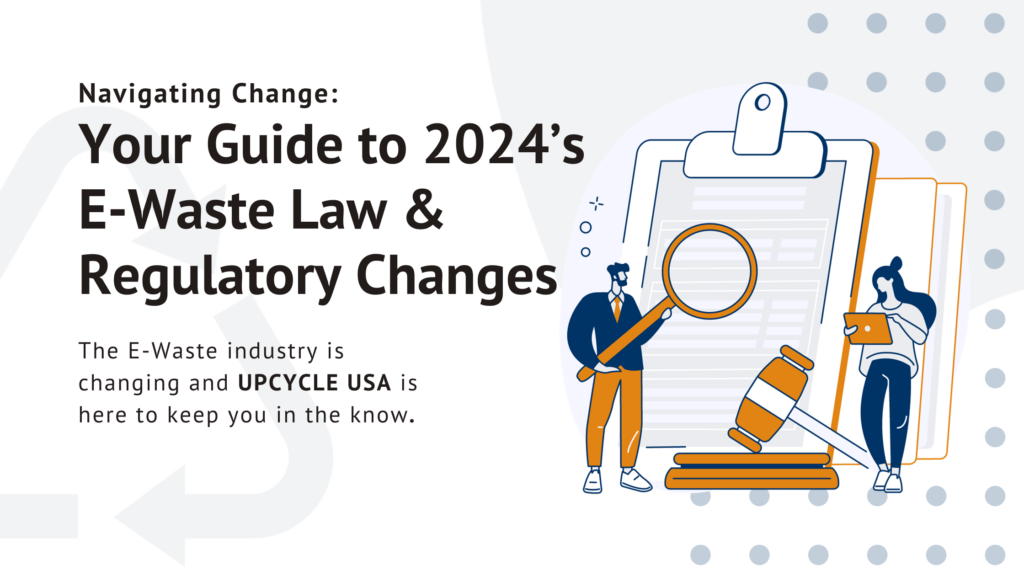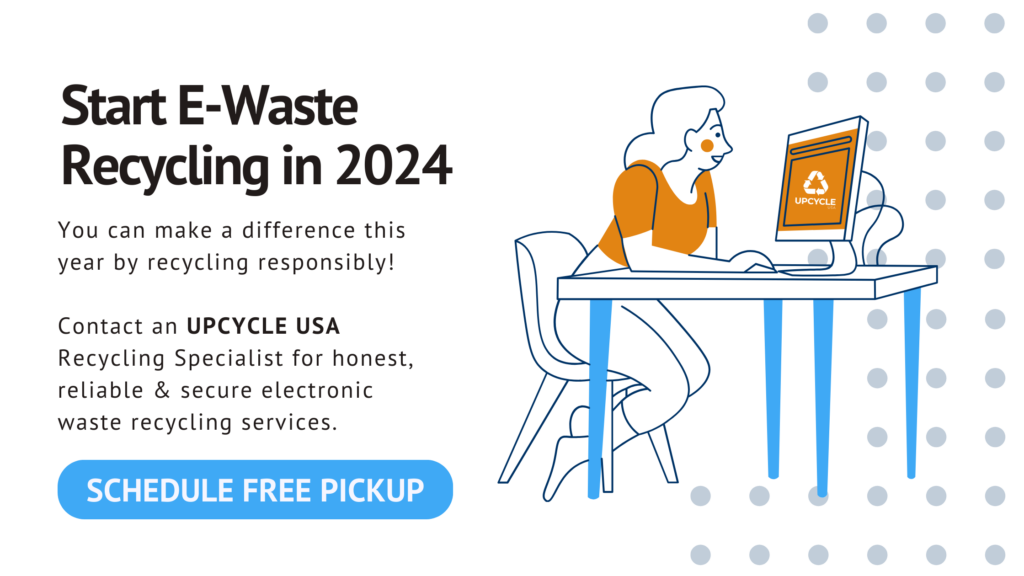
Creating a Sustainable E-Waste Policy for Your Company: Why It Matters and Steps to Take
In today’s digital world, electronic devices are crucial for business success, but…
Laws are changing around the E-Waste industry. Stay up to date on domestic and international E-Waste recycling expectations with UPCYCLE USA.

We live in an era dominated by technology and rapid innovation often comes at a cost – the growing issue of E-Waste. As we step out of 2023 and into a more sustainable 2024, significant changes are underway for E-Waste laws and regulations.
UPCYCLE USA’s article will provide you with an up to date recap on international and domestic E-Waste developments.
The global demand for electronic devices is rising and so is the number of used and discarded electronics.
An estimated 50 million tons of E-Waste are generated every year. To put that in perspective, the global E-Waste output exceeds the weight of all of the commercial airplanes ever made.
To keep up with E-Waste production, the life cycle of electronic devices and E-Waste recycling expectations are changing to create a better, more circular global economy.

One of the prominent trends in recent years has been the expansion of Extended Producer Responsibility (EPR) frameworks. These regulations shift the burden of responsible E-Waste management from consumers to manufacturers.
In 2024, several countries are expected to adopt or strengthen EPR policies, holding technology companies accountable for the entire life cycle of their products.
In United States, EPR laws are gaining momentum. Eleven states proposed new EPR regulations in 2023 and California, Colorado, Maine, Oregon have successfully passed EPR bills. In 2024 and beyond, manufacturing companies in these states will need to place more emphasis on manufacturing products designed with durability, recyclability, and minimal environmental impact.
Recognizing the global nature of electronic waste, there is a growing emphasis on harmonizing regulations across borders.
International organizations and agreements are playing a crucial role in fostering collaboration among nations to create consistent and effective E-Waste management practices. Their goal is to reduce discrepancies in regulations and streamline efforts to combat the transboundary movement of E-Waste.
It is estimated that 352,474 metric tons of electronic waste is illegally shipped from the EU to developing countries each year, most of which is exported to the African counteries including Nigeria, Ghana, and Tanzania. Illegal E-Waste trafficking is extremely harmful for those on the receiving end of the trafficking chain because electronic items containing toxic materials are left to decompose in landfills.
In response, many Eurpoean countries are tightening their grip on the import and export of E-Waste to curb illegal trafficking and ensure responsible disposal. The focus is not only on preventing the dumping of E-Waste in developing nations but also on fostering the recycling and recovery of valuable materials.
In the absence of national E-Waste policies in the U.S., it is crucial for American manufacturers and tech companies to promote responsible E-Waste recycling practices.
The entire E-Waste industry can expect to see more stringent checks and balances in 2024 to monitor the flow of electronic waste across borders.
To promote sustainable practices, governments are introducing incentives for businesses that adopt circular economy models. This involves designing products with recyclability in mind, encouraging repairability, and fostering the reuse of components.
Companies embracing these practices may benefit from tax breaks and other financial incentives, thereby driving a shift towards a more circular approach to electronics production.
In parallel with regulatory changes, there is a growing emphasis on educating consumers about the impact of E-Waste and the importance of responsible disposal.
Local governments are running awareness campaigns to inform the public about their recycling options, E-Waste collection points, and the environmental consequences of improper disposal. Smaller cities like West Covina in California plan to hold regular electronic waste drive-thru collections throughout 2024. California’s leadership in recycling electronic waste has helped to set the stage for national recycling policy change, a critical move for the country that produces the most E-Waste per person in the entire world.
In addition to these local awareness campaigns, cities like Minnesota are proposing a ballot initiative that could implement a 4% fee for the sales of all electronic items. If passed, those funds will create a E-Waste recycling fund for the city making E-Waste recycling free for everyone.

At UPCYCLE USA, we advocate for responsible E-Waste recycling and built our electronic recycling business around one idea – make electronic recycling FREE and EASY for EVERYONE.
While local governments are just starting to catch up to our business model, you can take advantage of our services today!
Let us help make E-Waste recycling easy and convenient for you! Contact a Recycling Specialist and ask about our FREE bulk pickup services.
Electronic Waste Recycling
At UPCYCLE USA, we make it easy for organizations to do the RIGHT thing with their End of Life Electronic (EOL) IT Equipment. Honest, reliable & secure electronic waste recycling services.